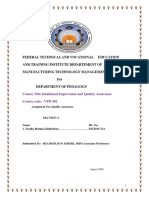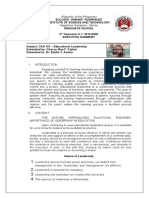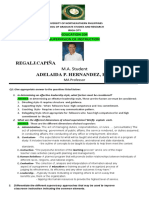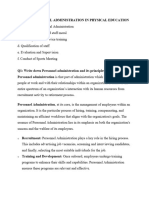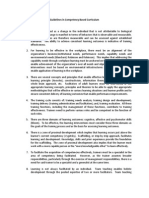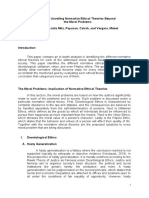0 ratings0% found this document useful (0 votes)
10 viewsSupervision of Instruction
Supervision of Instruction
Uploaded by
ivychristine.narismaCopyright:
© All Rights Reserved
Available Formats
Download as DOCX, PDF, TXT or read online from Scribd
Supervision of Instruction
Supervision of Instruction
Uploaded by
ivychristine.narisma0 ratings0% found this document useful (0 votes)
10 views4 pagesCopyright
© © All Rights Reserved
Available Formats
DOCX, PDF, TXT or read online from Scribd
Share this document
Did you find this document useful?
Is this content inappropriate?
Copyright:
© All Rights Reserved
Available Formats
Download as DOCX, PDF, TXT or read online from Scribd
Download as docx, pdf, or txt
0 ratings0% found this document useful (0 votes)
10 views4 pagesSupervision of Instruction
Supervision of Instruction
Uploaded by
ivychristine.narismaCopyright:
© All Rights Reserved
Available Formats
Download as DOCX, PDF, TXT or read online from Scribd
Download as docx, pdf, or txt
You are on page 1of 4
Supervision of Instruction
1. Illustrate through a schematic presentation, the supervision of successful
schools. Explain your presentation.
School supervision usually refers to the improvement of the overall
teaching-learning situation and the variables that impact it. The supervisor
should do study to identify the techniques, methods, and procedures that are
critical to the effectiveness of supervision. Supervisors should be sympathetic
and approachable, and there should be mutual respect and trust between the
supervisor and his or her employees. Be organized: A supervisor must be able to
handle problems and manage time demands calmly. In every institution the type of
leadership style is important for a successful environment. In order to
establish a successful school environment to compete globally, the leader
should comprehend the basic leadership theories and styles (Glickman et al.,
2010). The cultures at schools are important to the success of the students
and overall of the school, but also can be very difficult to establish and
maintain without the proper leadership knowledge (Waite, 1995). Defined as
an administrative process through which school managers or leaders ensures
that teachers are all contributing towards sound and qualitative teaching and
learning process, effective supervision is sine-qua-non to improved student
learning and achievement of educational goals (Quiroz, 2015).
2. Identify then justify three significant characteristics of successful schools.
Ans.
3. Interpersonal supervisory behavior is important to supervision. Discuss the
clustering of these behaviors and impact to supervision.
Interpersonal skills are defined as the ability adopted by the school principal
that allows the school to have a successful human interaction. The
responsibilities of school principals are so vast that they necessitate a variety
of approaches. In addition to their talents, the tactics involve developing
positive relationships with their employees and outsourcing some of their
responsibilities with authorities to their employees. This delegation boosts
trust, sociability, and loyalty among school administrators and staff, as well as
employee growth. Such personnel are more likely to be preoccupied with
fulfilling the many responsibilities assigned to them in a school in which the
principal voices worries about the personnel. Their duty is to create an
environment that encourages the development of human potential.
4. Technical skills are important to instructional supervisors. Discuss these by
hypothesizing on a workplace setting where these skills are deemed
important?
Instructional supervision is the work of ensuring the implementation of the
educational mission of a school by overseeing, equipping, and empowering
teachers to provide meaningful learning experiences for students.
The aims of instructional supervision are as follows:
(1) to provide objective feedback to teachers;
(2) to diagnose and solve teaching problems;
(3) to help teachers develop their strategies and skills;
(4) to evaluate teachers for promotions or appointments; and
(5) to help teachers maintain a positive attitude.
Every profession necessitates a unique mix of talents, which is why technical
skills are in high demand and critical for all careers for a variety of reasons.
They provide you with foundational knowledge and can help you work more
effectively, enhance your confidence, and make you a more valuable
prospect to potential companies. When compared to other generic profiles,
technical professionals frequently earn more. Businesses are constantly on
the search for specialized educated workers since their clients want to work
with highly competent teams that they can trust to produce the outcomes they
require.
5. Comment on the quotation, Supervision is to be viewed as a process and a
function rather than a role or a position.
The purpose of the supervision process is to provide a safe, supportive
opportunity for individuals to engage in critical reflection in order to raise
issues, explore problems, and discover new ways of handling both the
situation and oneself. A critical aspect of supervision lies in its potential to
educate.
Two central goals of supervision are:
(a) promoting supervisee developmental growth through teaching (i.e.,
enhancing the supervisee's knowledge and applied skills), and
(b) protecting the welfare of clients (i.e., making sure individuals the
supervisee is working with are receiving high quality professional services).
Definitions of supervision tell us something about what supervision aims to
achieve or the function(s) it intends to fulfil.
Although there are various definitions of supervision there are commonalities
between them. Some place more emphasis on the organizational purpose of
supervision while others focus more on the individual.
You might also like
- School Supervision Concept and TheoriesDocument9 pagesSchool Supervision Concept and TheoriesArj Bee100% (4)
- Module 4 Learning and DevelopmentDocument9 pagesModule 4 Learning and DevelopmentCALIPDAN, Roselyn D. (Lyn)100% (1)
- Module 4 Learning and DevelopmentDocument10 pagesModule 4 Learning and DevelopmentMelg VieNo ratings yet
- Eulogio "Amang" Rodriguez Institute of Science and Technology Graduate School 2 Semester S.Y. 2019-2020 Final ExaminationDocument3 pagesEulogio "Amang" Rodriguez Institute of Science and Technology Graduate School 2 Semester S.Y. 2019-2020 Final ExaminationNoel MalanumNo ratings yet
- Assigment 2-8616Document20 pagesAssigment 2-8616umair siddiqueNo ratings yet
- GM - Midterm 2023 (FYI)Document24 pagesGM - Midterm 2023 (FYI)thihalay92No ratings yet
- Activity 204Document6 pagesActivity 204Maricel Fernandez AbogadoNo ratings yet
- BED234 UNIT - 3 NewDocument8 pagesBED234 UNIT - 3 NewSanjay BhardwajNo ratings yet
- Edf 321Document13 pagesEdf 321Chipiliro KanyengoNo ratings yet
- SupervisionDocument16 pagesSupervisionkalid Mohammed100% (1)
- Educational LeadershipDocument17 pagesEducational LeadershipHanis HNo ratings yet
- Instructional Leadership Complete FileDocument159 pagesInstructional Leadership Complete FileBisma ShafiqNo ratings yet
- Leadership Style in EducationDocument15 pagesLeadership Style in EducationJovanson TonyNo ratings yet
- Federal Technical and Vocational Education and Training Institute Departement of Manufacturing Technology Management For Department of PedagogyDocument7 pagesFederal Technical and Vocational Education and Training Institute Departement of Manufacturing Technology Management For Department of PedagogyBizuayehu TadesseNo ratings yet
- Name: Naveed Shahzad Roll No: cb661612 Course Code: (8605)Document10 pagesName: Naveed Shahzad Roll No: cb661612 Course Code: (8605)Naveed MughalNo ratings yet
- Balasta - Kbem AssessmentsDocument5 pagesBalasta - Kbem AssessmentsGoshen ShamaSelahNo ratings yet
- Unit - 11 Management DevelopmentDocument9 pagesUnit - 11 Management DevelopmentSanketNo ratings yet
- Module Review For Practicum in Educational AdministrationDocument62 pagesModule Review For Practicum in Educational AdministrationCorazon R. LabasanoNo ratings yet
- Zayrel Velasque-WPS OfficeDocument9 pagesZayrel Velasque-WPS OfficeClarence CajayonNo ratings yet
- Education Management PDFDocument13 pagesEducation Management PDFChishale FridayNo ratings yet
- Activity 13 - Educational Supervision - OutputDocument4 pagesActivity 13 - Educational Supervision - OutputRaymart NaagNo ratings yet
- Human Resource Management and Development in EducationDocument4 pagesHuman Resource Management and Development in EducationjasonNo ratings yet
- Vrepublic of The Philippines: Insert Photo HereDocument7 pagesVrepublic of The Philippines: Insert Photo HereNoel MalanumNo ratings yet
- Final Exam in Educ 203. Administration and SupervisionDocument3 pagesFinal Exam in Educ 203. Administration and SupervisionNiña Irish CrisolNo ratings yet
- IndustrialDocument11 pagesIndustrialKevin NDAYIZEYENo ratings yet
- MANAGEMENT TUTORIAL SHEET 1Document10 pagesMANAGEMENT TUTORIAL SHEET 1Nathefa LayneNo ratings yet
- What Is MentoringDocument5 pagesWhat Is MentoringDeepak Kumar SinghNo ratings yet
- Leadership Principles Assignment 2Document8 pagesLeadership Principles Assignment 2Goodwin BandaNo ratings yet
- Concept of Supervision: B. Ed (1.5 Year) Online Workshop Course Code: 8605Document34 pagesConcept of Supervision: B. Ed (1.5 Year) Online Workshop Course Code: 8605ilyas100% (1)
- Adm TRDocument9 pagesAdm TRjoelyin2No ratings yet
- QUALITY - A Prime Focus Point For Management Education of The Modern EraDocument8 pagesQUALITY - A Prime Focus Point For Management Education of The Modern EraSiva Krishna Reddy NallamilliNo ratings yet
- Educational Leadership Miss oDocument12 pagesEducational Leadership Miss oJotham ShumbaNo ratings yet
- Career Planning and DevelopmentDocument22 pagesCareer Planning and DevelopmentpjcolitaNo ratings yet
- Training Framework For An OrganisationDocument19 pagesTraining Framework For An OrganisationSumit KumarNo ratings yet
- Zamboangacity State Polytechnic College Graduate SchoolDocument21 pagesZamboangacity State Polytechnic College Graduate SchoolRosario Perez Ocamia100% (1)
- 8616 PDFDocument36 pages8616 PDFMemoona AhmadNo ratings yet
- The Importance of Continuous Professional Development For EducatorsDocument5 pagesThe Importance of Continuous Professional Development For Educatorsmarian fae Mallari100% (1)
- Chapter 1 3Document37 pagesChapter 1 3ALAYSHA ALINo ratings yet
- pGDE 710 EducationDocument13 pagespGDE 710 Educationdessjack531No ratings yet
- Supervision and Supervision in Digital AgeDocument63 pagesSupervision and Supervision in Digital AgeMarch DesireeNo ratings yet
- Assigment ManagementDocument4 pagesAssigment Managementsarimnaeem250No ratings yet
- EducationDocument8 pagesEducationAimanNo ratings yet
- Lead Workplace CommunicationDocument11 pagesLead Workplace CommunicationFabie BarcenalNo ratings yet
- Final ProjectDocument10 pagesFinal Projectapi-254707542No ratings yet
- Chapter Ii SummaryDocument9 pagesChapter Ii Summarychanceschase0421No ratings yet
- Supervision of Instruction MasteralDocument4 pagesSupervision of Instruction MasteralRegal Jugueta CapinaNo ratings yet
- Porffolio in Supervision of Instruction: Arianne B. RecentesDocument17 pagesPorffolio in Supervision of Instruction: Arianne B. RecentesArianne RecentesNo ratings yet
- Learning and Development AnalyticsDocument6 pagesLearning and Development Analyticsswarnpriyaswarn2366No ratings yet
- Chapter 5Document26 pagesChapter 5eshetu mebratieNo ratings yet
- 1 Lead Work Place CommunicationDocument13 pages1 Lead Work Place CommunicationFabie BarcenalNo ratings yet
- Unit 2Document51 pagesUnit 2nicevenuNo ratings yet
- Martinez, Mary Ann D. - Ed 229 ExaminationDocument5 pagesMartinez, Mary Ann D. - Ed 229 ExaminationMary Ann MartinezNo ratings yet
- UNIT03Document11 pagesUNIT03afshan jabeenNo ratings yet
- Practicum in School Administration - ModuleDocument5 pagesPracticum in School Administration - ModulePinky Noveno MaglangitNo ratings yet
- C0ntinuing Professional DevelopmentDocument12 pagesC0ntinuing Professional DevelopmentfatimaNo ratings yet
- HRM460 SEC-2 Final AssignmentDocument6 pagesHRM460 SEC-2 Final AssignmentTayeb KhanNo ratings yet
- Oral Test Preparation-Professional Development and LeadershipDocument16 pagesOral Test Preparation-Professional Development and LeadershipYan LiuNo ratings yet
- Guidelines in Competency Based CurriculumDocument2 pagesGuidelines in Competency Based CurriculumbjnpedronptrpNo ratings yet
- Ink & Insights: Mastering Business Coaching in the Digital AgeFrom EverandInk & Insights: Mastering Business Coaching in the Digital AgeNo ratings yet
- Tangram Puzzle PDFDocument10 pagesTangram Puzzle PDFasfNo ratings yet
- IATMI Professional Paper Digital Presentation 2020 ScheduleDocument1 pageIATMI Professional Paper Digital Presentation 2020 ScheduleKarolinaNo ratings yet
- Pertemuan 7 - 24 & 27 Sept 2019Document108 pagesPertemuan 7 - 24 & 27 Sept 2019ramandaNo ratings yet
- Automatic Slack Adjuster (ASA)Document2 pagesAutomatic Slack Adjuster (ASA)Patricio G. ArrienNo ratings yet
- Disclosure To Promote The Right To Information: IS 6135 (1981) : Soda Ash, Fused, Technical (CHD 1: Inorganic Chemicals)Document17 pagesDisclosure To Promote The Right To Information: IS 6135 (1981) : Soda Ash, Fused, Technical (CHD 1: Inorganic Chemicals)Kaka BabaNo ratings yet
- G-21, Community Services Project PDFDocument24 pagesG-21, Community Services Project PDFved bhaskerNo ratings yet
- S H Manto Black MarginsDocument5 pagesS H Manto Black MarginsCol Dr Akhtar Ahmed KhaliliNo ratings yet
- Topic 6 Thinking SkillsDocument10 pagesTopic 6 Thinking SkillsMissBigHeadNo ratings yet
- Lesson 27 Coulombs LawDocument11 pagesLesson 27 Coulombs Lawi5piritiNo ratings yet
- Aznar VS GarciaDocument6 pagesAznar VS GarciaEmman FernandezNo ratings yet
- Attraction and Intimacy Reading 1Document8 pagesAttraction and Intimacy Reading 1joms magNo ratings yet
- Transcript ApplicationDocument2 pagesTranscript ApplicationSwetha ReddyNo ratings yet
- Department of Treasuries and Accounts, Tamil Nadu, IndiaDocument4 pagesDepartment of Treasuries and Accounts, Tamil Nadu, IndiasnaponumeshNo ratings yet
- 4 Lecture Note 9 Fixed Point Itration MethodDocument17 pages4 Lecture Note 9 Fixed Point Itration Methodsatvik mishraNo ratings yet
- Full Download Textbook of Diagnostic Microbiology, 7e (Jan 4, 2023)_(032382997X)_(Elsevier) Connie R. Mahon PDF DOCXDocument47 pagesFull Download Textbook of Diagnostic Microbiology, 7e (Jan 4, 2023)_(032382997X)_(Elsevier) Connie R. Mahon PDF DOCXizaniemanoly100% (3)
- Philip Larkin PoetryDocument11 pagesPhilip Larkin Poetryrok mod100% (1)
- 191119-GCA3076-MS ANITA GAIKWAD-. Antimicrobial Susceptibility Test NEGDocument1 page191119-GCA3076-MS ANITA GAIKWAD-. Antimicrobial Susceptibility Test NEGMohan RadiyaNo ratings yet
- 1 07 Heavy Metals Limit Test 46Document2 pages1 07 Heavy Metals Limit Test 46student_bbNo ratings yet
- Mustang 5.0l GT LangkawiDocument2 pagesMustang 5.0l GT Langkawitommylyh26No ratings yet
- The Letter From Birmingham Jail by DRDocument3 pagesThe Letter From Birmingham Jail by DRapi-269004027No ratings yet
- Normative Ethics-Ethics Final ExamDocument7 pagesNormative Ethics-Ethics Final ExamCAIRAH PAYUSANNo ratings yet
- 01 Fico Configuration NotesDocument18 pages01 Fico Configuration NotesDERYA KALE ERDEMLİNo ratings yet
- Course Outline Dcc2052Document5 pagesCourse Outline Dcc2052YayaTohNo ratings yet
- OMAM Character List With DescriptionDocument1 pageOMAM Character List With DescriptionMicaela DavisNo ratings yet
- Unifi Home Form Revised - 012020Document4 pagesUnifi Home Form Revised - 012020Muhammad Akmal RazmiNo ratings yet
- Branch Instructions (2) : Refilled. Writing PC-4 Into The LR of The Current BankDocument13 pagesBranch Instructions (2) : Refilled. Writing PC-4 Into The LR of The Current BankGilberto VirgilioNo ratings yet
- Mission Action Plan 2016Document2 pagesMission Action Plan 2016api-241670604No ratings yet
- BST PQMS2Document10 pagesBST PQMS2jaiNo ratings yet
- The Impact of Blockchain On The Accounting ProfessionDocument10 pagesThe Impact of Blockchain On The Accounting ProfessionMstefNo ratings yet
- Kirtan Sohila Eng Rom GurmDocument5 pagesKirtan Sohila Eng Rom GurmdeepyyNo ratings yet













